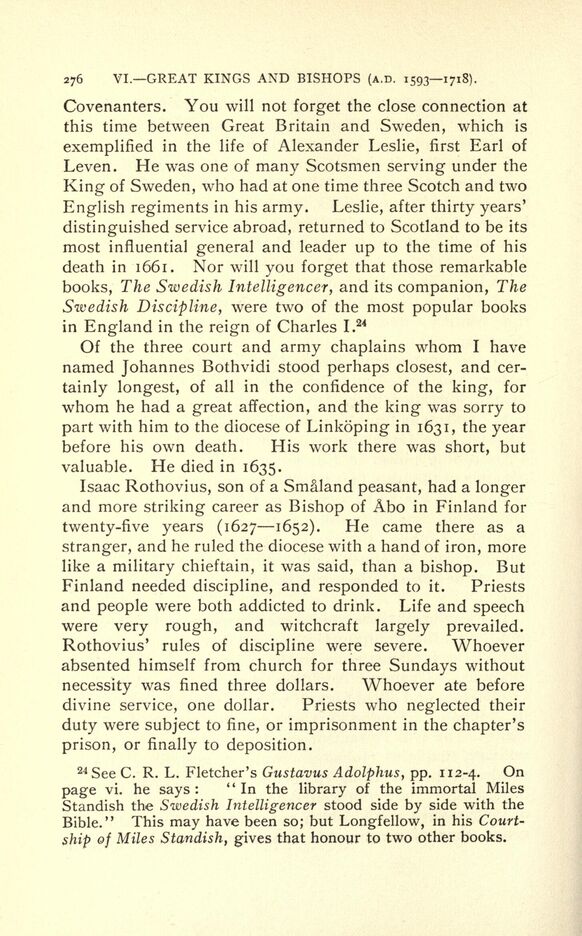
Full resolution (JPEG) - On this page / på denna sida - VI. From the Upsala-möte to the death of Charles XII. The Great Kings and the Great Bishops (1592—1718 A.D.)

<< prev. page << föreg. sida << >> nästa sida >> next page >>
Below is the raw OCR text
from the above scanned image.
Do you see an error? Proofread the page now!
Här nedan syns maskintolkade texten från faksimilbilden ovan.
Ser du något fel? Korrekturläs sidan nu!
This page has never been proofread. / Denna sida har aldrig korrekturlästs.
2 76 VI. GREAT KINGS AND BISHOPS (A.D. 15931718).
Covenanters. You will not forget the close connection at
this time between Great Britain and Sweden, which is
exemplified in the life of Alexander Leslie, first Earl of
Leven. He was one of many Scotsmen serving under the
King of Sweden, who had at one time three Scotch and two
English regiments in his army. Leslie, after thirty years
distinguished service abroad, returned to Scotland to be its
most influential general and leader up to the time of his
death in 1661. Nor will you forget that those remarkable
books, The Swedish Intelligencer, and its companion, The
Swedish Discipline, were two of the most popular books
in England in the reign of Charles I.
24
Of the three court and army chaplains whom I have
named Johannes Bothvidi stood perhaps closest, and cer
tainly longest, of all in the confidence of the king, for
whom he had a great affection, and the king was sorry to
part with him to the diocese of Linkoping in 1631, the year
before his own death. His work there was short, but
valuable. He died in 1635.
Isaac Rothovius, son of a Smaland peasant, had a longer
and more striking career as Bishop of Abo in Finland for
twenty-five years (1627 1652). He came there as a
stranger, and he ruled the diocese with a hand of iron, more
like a military chieftain, it was said, than a bishop. But
Finland needed discipline, and responded to it. Priests
and people were both addicted to drink. Life and speech
were very rough, and witchcraft largely prevailed.
Rothovius rules of discipline were severe. Whoever
absented himself from church for three Sundays without
necessity was fined three dollars. Whoever ate before
divine service, one dollar. Priests who neglected their
duty were subject to fine, or imprisonment in the chapter s
prison, or finally to deposition.
24
See C. R. L. Fletcher s Gustavus Adolphus, pp. 112-4. On
page vi. he says :
"
In the library of the immortal Miles
Standish the Swedish Intelligencer stood side by side with the
Bible." This may have been so; but Longfellow, in his Court
ship of Miles Standish, gives that honour to two other books.
<< prev. page << föreg. sida << >> nästa sida >> next page >>